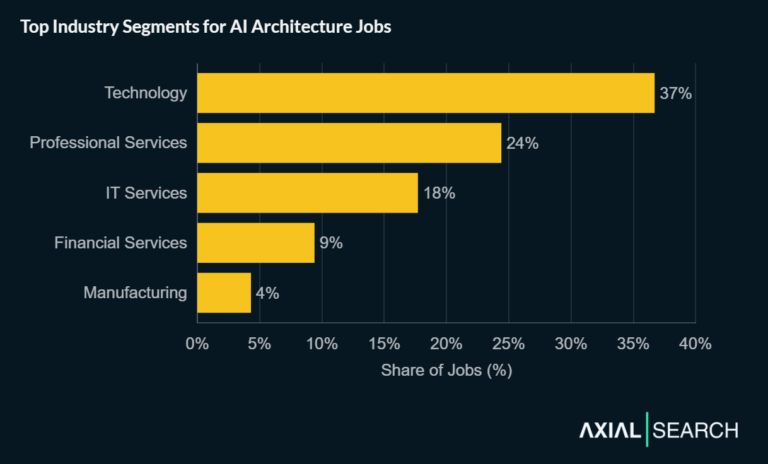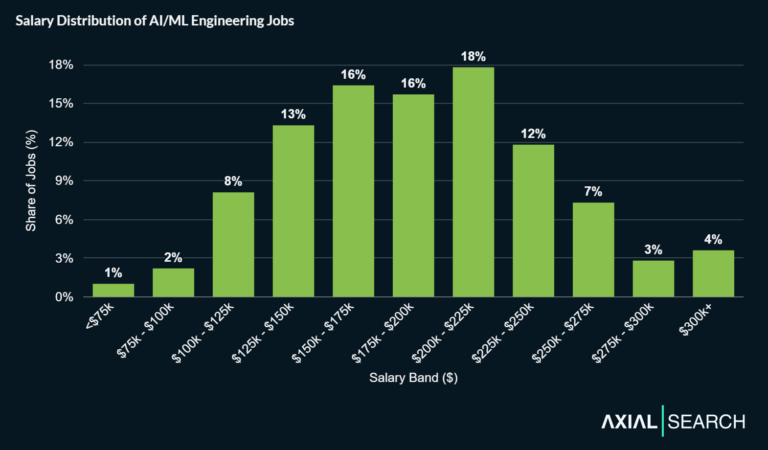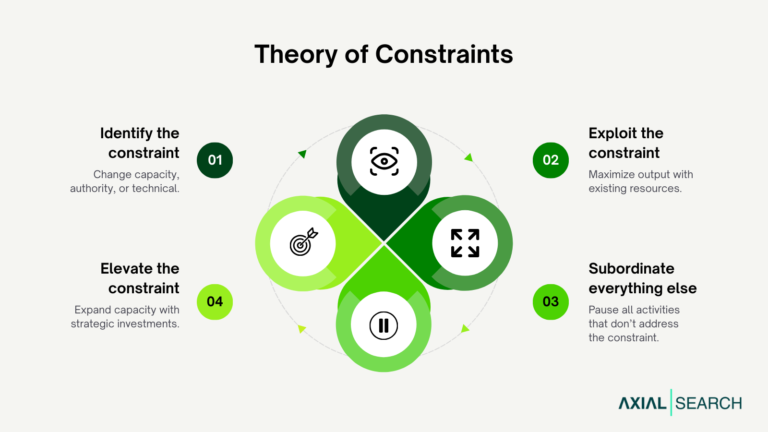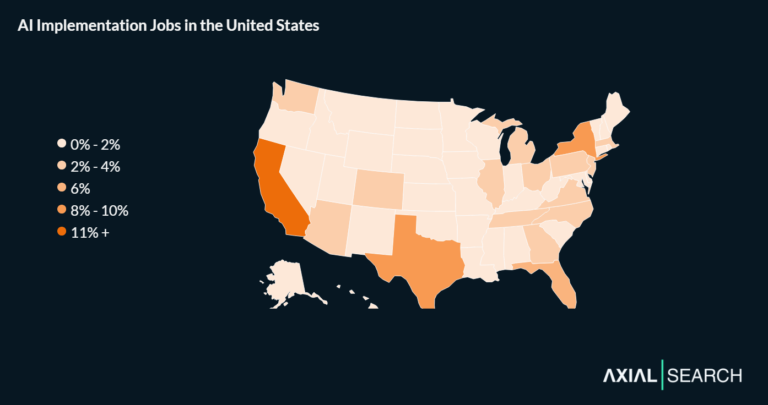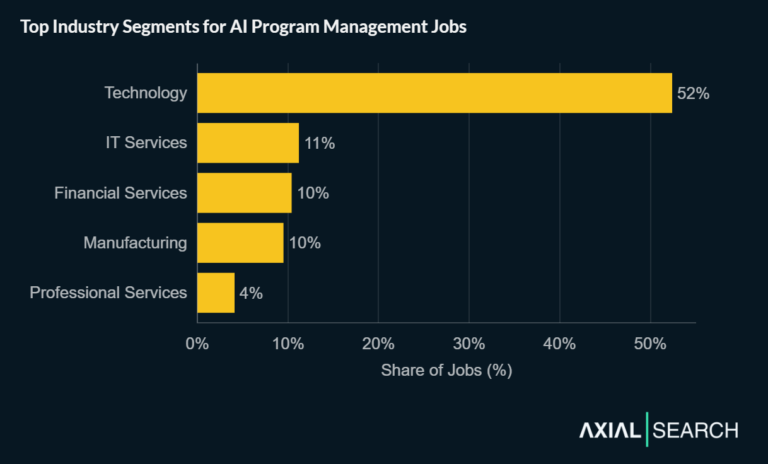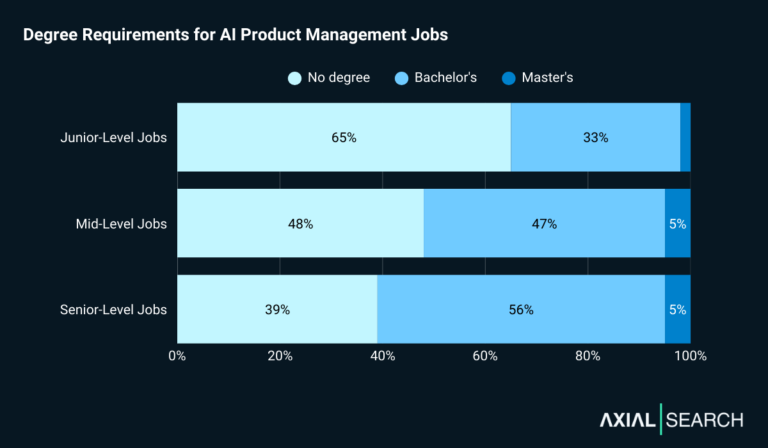Key Findings
- Most roles are senior-level: 71% of AI strategy positions target professionals with 10+ years of experience
- Median salary is $221,000: The middle 80% of roles pay between $147K and $310K annually
- Certifications appear in just 10% of posts: PMP, PROSCI Change Management and AWS Machine Learning certifications lead requests
- Technology firms dominate hiring: Technology (31%), Professional Services (21%) and Financial Services (15%) lead postings
- New York and California lead the market: Each state captures 15% of U.S. roles
- Technical degrees increasingly required: Only about one third of roles do not have a degree requirement.
The Role of an AI Strategy Professional
These patterns align with what we see across AI recruitment, where organizations balance technical vision with organizational transformation.
We categorized each role by seniority and found the market heavily skews toward senior professionals—they account for more than two-thirds of all postings.
We then extracted experience requirements (84% of roles mentioned a specific number) and calculated the average minimum at each level of seniority. Finally, we analyzed job titles to identify the most common naming conventions at each level.
- Junior (3% of roles)
- Minimum experience: 4 years
- Common titles: AI Deployment Strategist, AI Content Strategist, Lead/VP Python AI/ML Developer
- Mid-Level (26% of roles)
- Minimum experience: 6 years
- Common titles: AI Strategist, Executive Partner Artificial Intelligence Advisory, Director AI/ML Engineering
- Senior (71% of roles)
- Minimum experience: 10 years
- Common titles: Head of Data & AI Transformation Programs, VP Product Management AI, Chief Data Officer
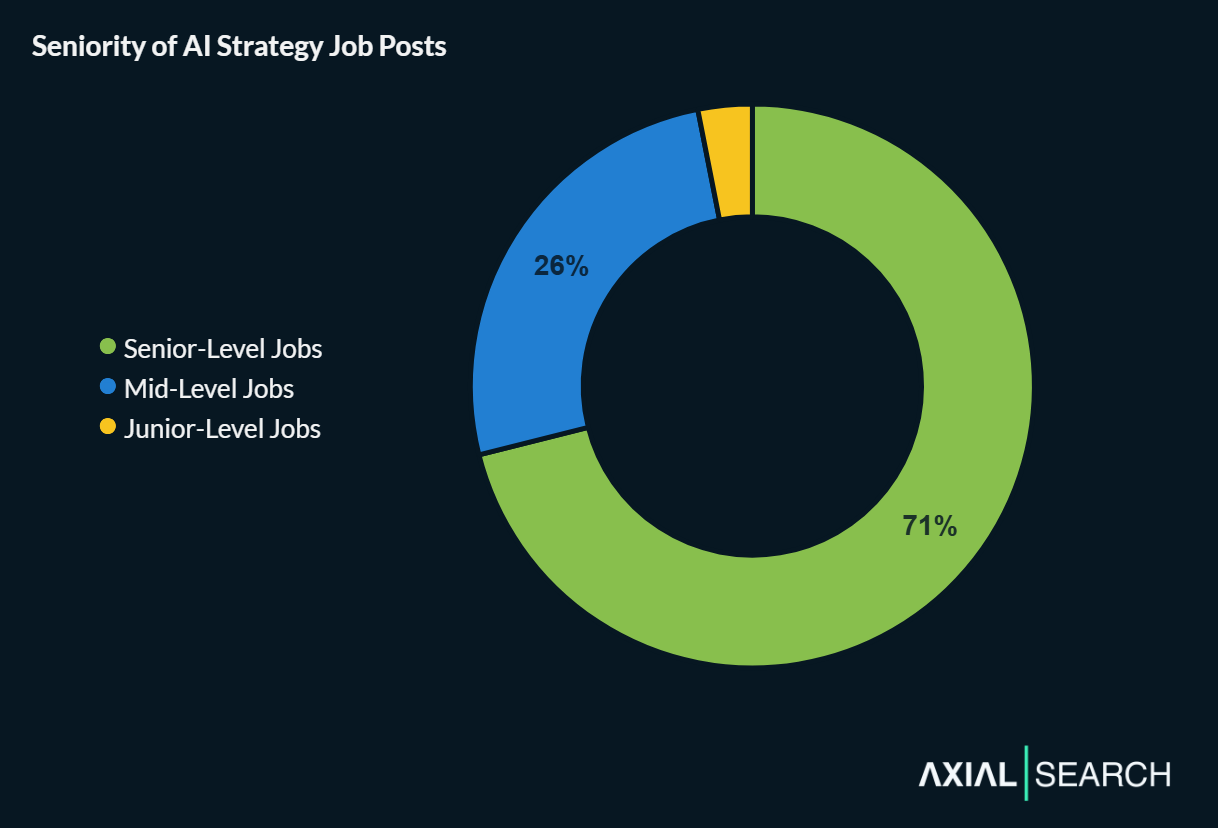
Most AI strategy jobs target senior professionals
What Do AI Strategy Jobs Involve?
So what is an AI strategist actually responsible for day-to-day? We analyzed the language across all 1,859 job posts to extract the core responsibilities at each level. What emerged is a clear progression of expectations from execution to vision:
Junior-Level Roles:
- Connect technical AI capabilities to enterprise needs through deployment execution
- Build AI foundations through hands-on work designing experiments and prototyping solutions
- Enable adoption by training staff and ensuring clarity across teams
Mid-Level Roles:
- Design enterprise AI roadmaps aligning business objectives with technical maturity
- Own cross-functional delivery balancing strategic C-suite advisory with hands-on architecture
- Drive business outcomes by identifying use cases and building analytics infrastructure
Senior-Level Roles:
- Define enterprise AI vision and translate it into production-scale programs with governance
- Orchestrate organizational transformation by leading Centers of Excellence across regions
- Shape market positioning through foundation model research and responsible AI architecture
Key takeaway: Junior strategists execute deployment, mid-level leaders own roadmaps and delivery, senior executives define organizational vision. Each step up means more influence over how AI transforms the enterprise and less hands-on technical work.
Who’s Hiring for AI Strategy?
Technology companies lead with 31% of AI strategy postings. Professional Services follows at 21%, with Financial Services rounding out the top three at 15%. IT Services captures 10%, with Telecom & Media at 6% completing the top five.
The technology sector’s lead makes sense—most AI strategists either shape internal AI adoption for tech firms or advise enterprise clients through consulting engagements on complex transformation initiatives.
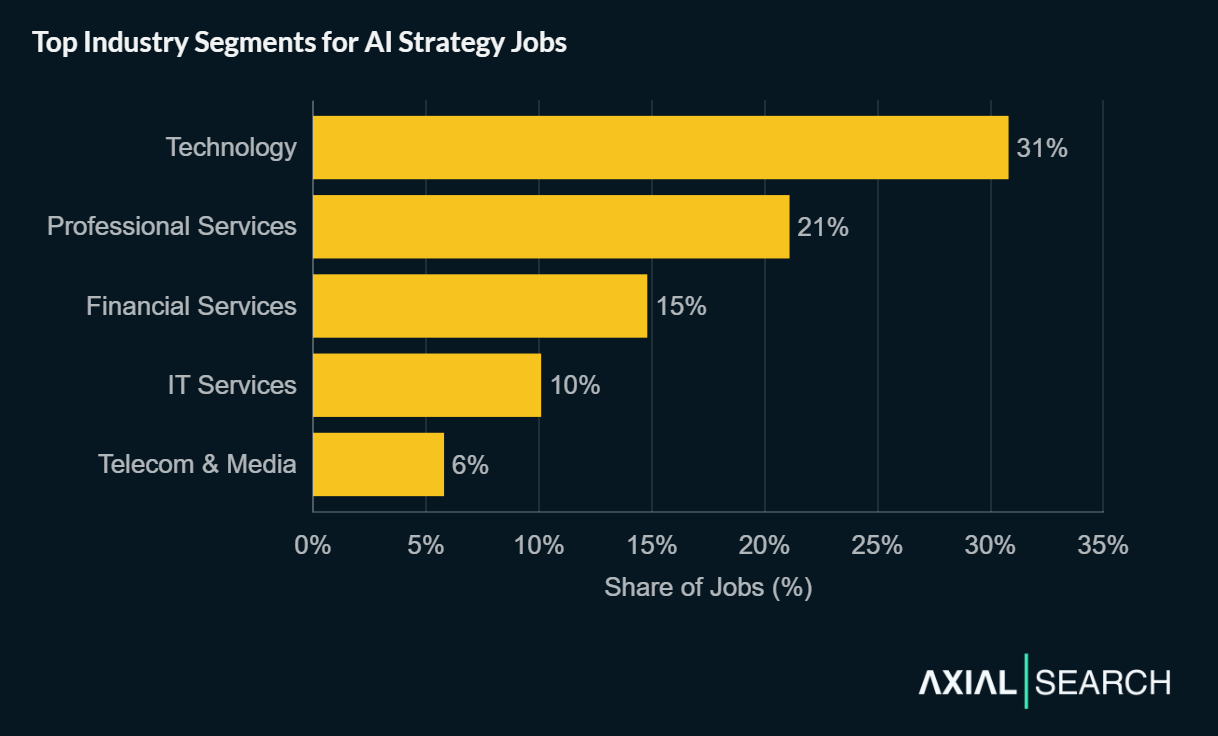
Technology and consulting firms lead AI strategy hiring
Large companies with 10,001+ employees account for 39% of postings—modestly above the economy’s wider workforce distribution of ~30%. Organizations with 1,001-10,000 employees add another 17%, meaning roughly half of AI strategy roles are at companies with over 1,000 employees.
Mid-sized companies (201-1,000 employees) capture 13% of the market, while smaller organizations (under 200 employees) post 31% of roles combined. This broader distribution suggests both established enterprises and venture-backed startups are building strategic AI capabilities.
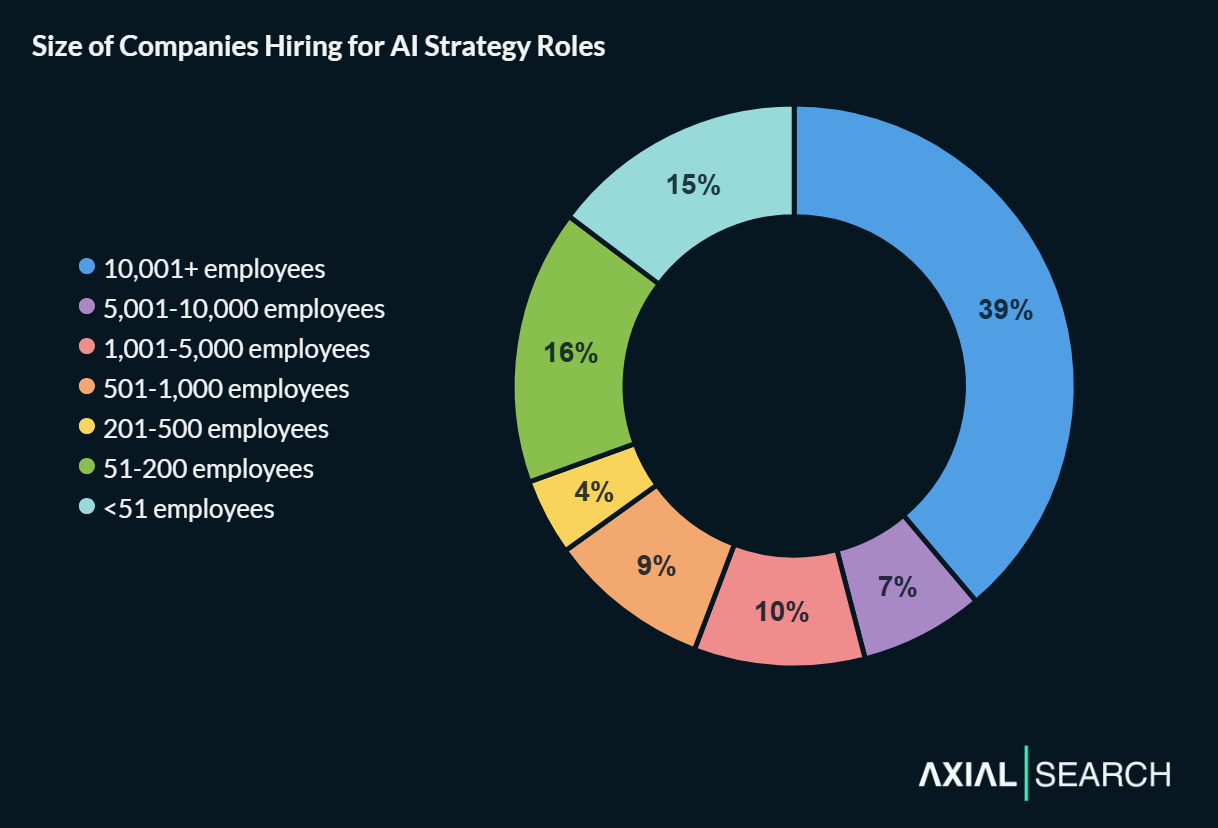
Both large corporations and startups hire AI strategists
Where Are AI Strategy Jobs Located?
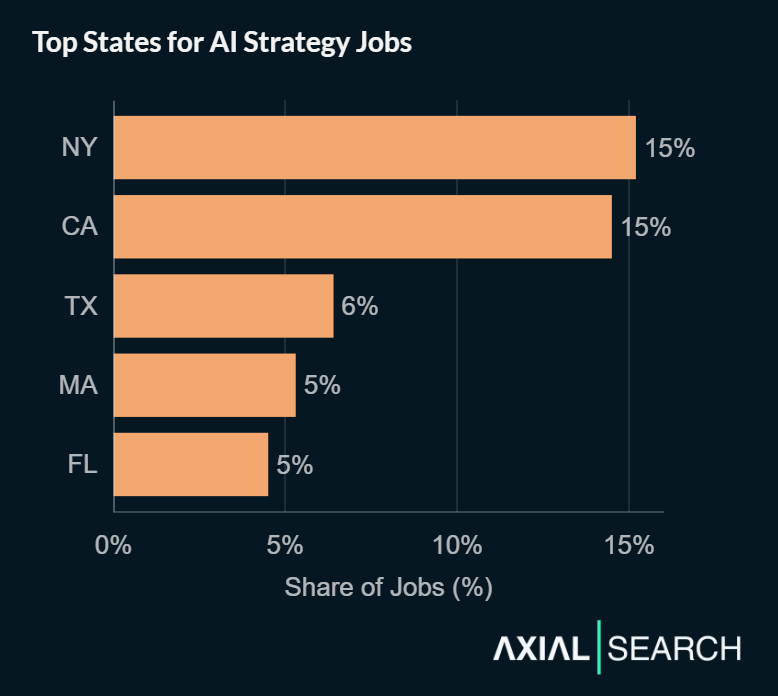
New York and California share top billing for AI strategy jobs
New York and California each capture 15% of AI strategy opportunities—tied at the top of the market. Texas follows at 6%, with Massachusetts and Florida each at 5% rounding out the top five.
The coastal concentration reflects tech and financial services hubs, though the geographic spread provides more options than hyper-concentrated specializations. Remote roles account for just 13% of postings despite the strategic nature of the work, suggesting organizations prefer AI strategists on-site where they can collaborate directly with executive leadership and engineering teams.
Beyond the top five, AI strategy hiring appears across the country. Every state in our dataset shows demand for AI strategists, reflecting how organizations nationwide are building strategic AI capabilities rather than concentrating this function exclusively in traditional tech hubs.
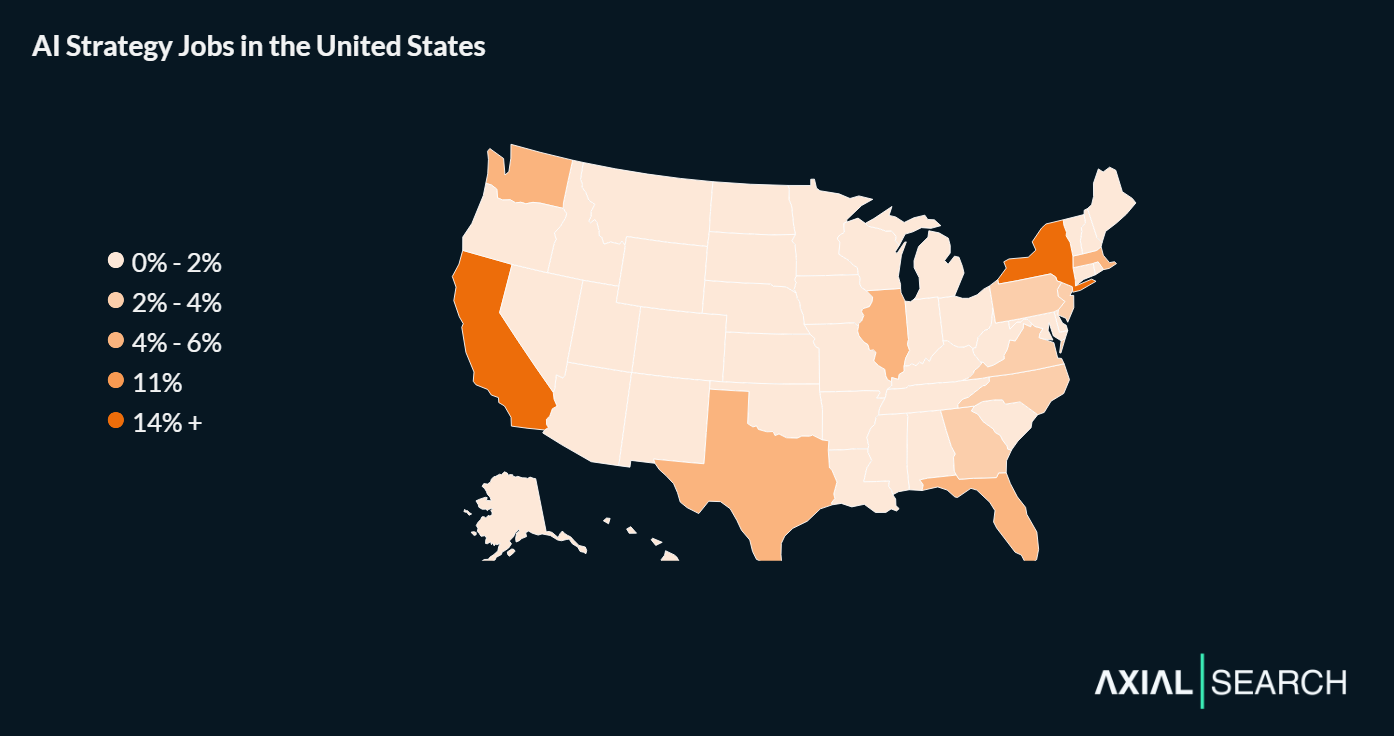
Every state in our dataset is hiring for AI strategists
Key takeaway: New York and California offer equal opportunity volumes at the top. Texas, Massachusetts and Florida provide the next tier, but every state shows demand—AI strategy roles are more geographically distributed than many specialized tech functions. Expect on-site or hybrid requirements for most positions given the collaborative nature of transformation work.
Requirements for AI Strategy Jobs
We analyzed the minimum requirements of each job post and found that most AI strategy jobs (60%) require some form of degree. Interestingly, the pattern holds relatively steady across seniority levels—suggesting experience and capability matter more than credentials alone.
For junior roles, 64% require a degree (58% bachelor’s, 4% master’s, 2% PhD). The remaining 36% don’t specify formal education requirements.
Mid-level positions show similar patterns: 51% require a degree (41% bachelor’s, 8% master’s, 2% PhD).
Senior roles maintain comparable requirements: 63% require a degree (43% bachelor’s, 16% master’s, 4% PhD).
Degree fields of study that are typically requested of AI strategists include:
- Computer Science (36%)
- Engineering (20%)
- Business (13%)
- Statistics (10%)
- Data Science (9%)
- Economics (9%)
- Mathematics (8%)
- Analytics (6%)
- Applied Mathematics (5%)
- Artificial Intelligence (5%)
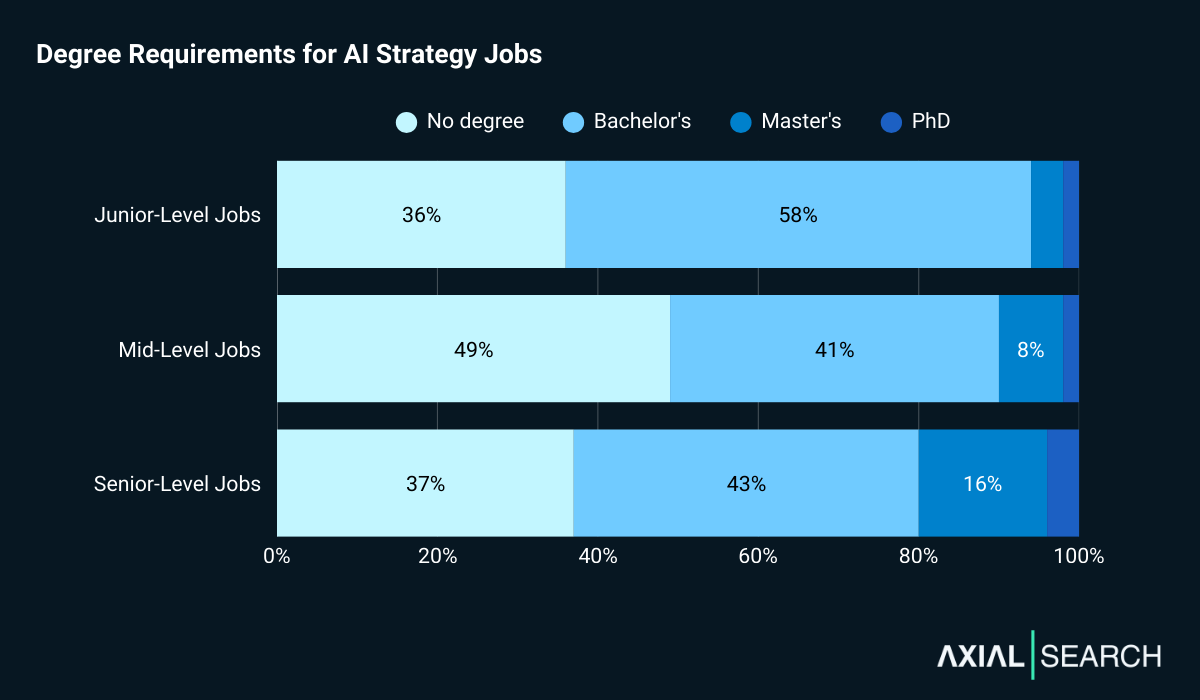
Degree requirements remain consistent across seniority levels
Requested Qualifications in AI Strategy Job Posts
AI strategists must excel at team leadership, communication and cross-functional collaboration. Team leadership appeared in 32% of listings, with communication and cross-functional collaboration each surfacing in 22% of postings.
These skills reflect the role’s bridging function—translating technical AI capabilities into business strategy while orchestrating multiple stakeholders simultaneously.
Change management (21%), stakeholder engagement (20%) and stakeholder management (19%) round out the core capabilities, emphasizing the need to drive organizational adoption alongside technical delivery.
Technical expertise matters equally. AI strategy (15%), generative AI (14%) and machine learning (12%) are table stakes, supported by hands-on experience with frameworks like Agile, MLOps and RAG.
Just 10% of postings request specific certifications, but when they do, these credentials lead:
- Project Management Professional (PMP)
- PROSCI Change Management
- AWS Certified Machine Learning – Specialty
- Microsoft Certified: Azure AI Engineer Associate
- NVIDIA Deep Learning Institute Certification
- Databricks Certified Associate
- Salesforce Agentforce Specialist
- Certified Information Systems Security Professional (CISSP)
Key takeaway: Leadership and communication capabilities separate successful AI strategists from purely technical professionals. Transformation and change management skills like stakeholder alignment and organizational change drive adoption—technical depth alone doesn’t get AI implementations across the finish line.
What do AI Strategy Jobs Pay?
More than half (59%) of the AI strategy roles we analyzed included an advertised salary.
There was significant breadth in the ranges employers posted, so we normalized the data by selecting the midpoint for our analysis. From our experience, this is generally a much more indicative number for an employer’s target offer—especially in the current market where initial ranges often run wide.
Across the entire dataset of salaries, we found the median salary for AI strategy positions to be $221,000. The middle 80% of salaries (10th to 90th percentile) ranged from $147,000 to $310,000.
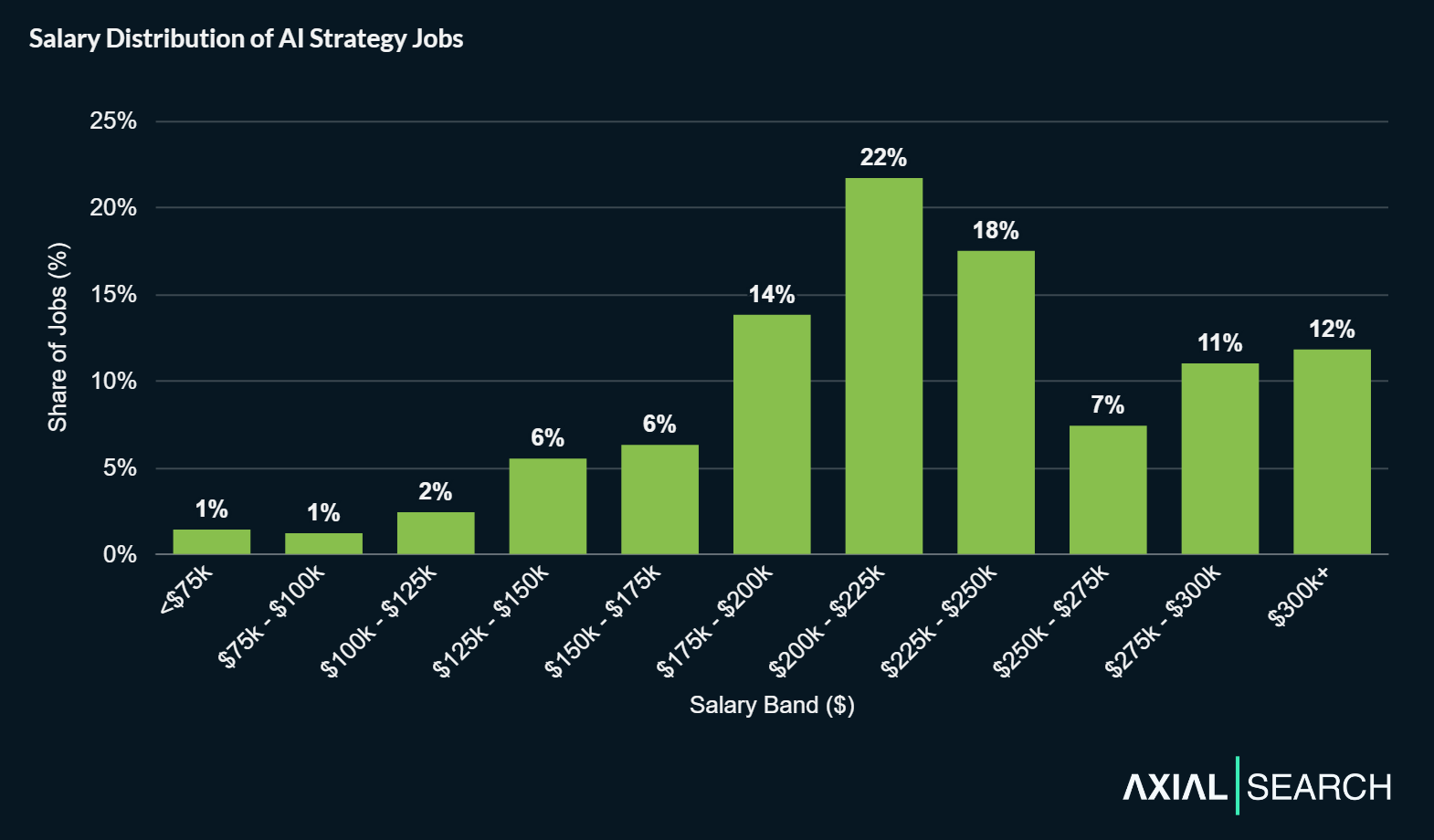
Most AI strategy salaries fall between $147K and $310K
Breaking AI strategy salaries down by seniority reveals steep progression between junior and mid-level, with more modest increases at senior tiers. Junior roles start at a median $139,500, with mid-level positions jumping 37% to $190,175. The leap to senior adds another 20%—reaching $229,700 median.
What’s notable is the overlap between mid-level and senior ranges. Mid-level roles at the 75th percentile closely track with senior median compensation—suggesting that high-performing mid-level strategists working on complex transformation initiatives can command senior-level pay.
Senior roles show the widest absolute range—$176,500 to $315,844—yet the premium over mid-level is modest compared to the jump from junior. This suggests compensation at senior levels reflects organizational influence and transformation scope more than years of experience.
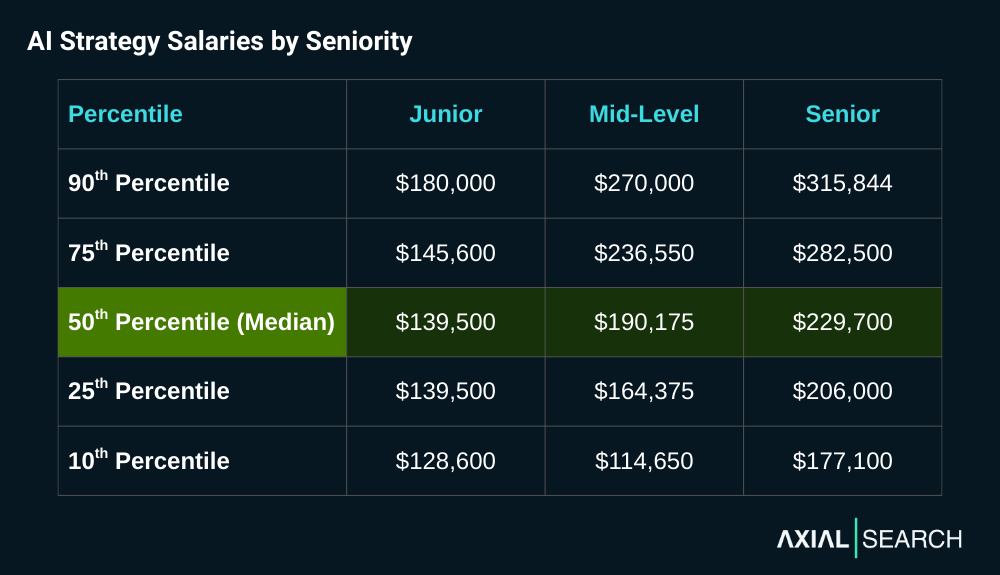
Senior AI strategists earn top 5% of U.S. incomes
Key takeaway: AI strategy positions pay exceptionally well. The median senior-level salary of $229,700 puts these roles in the top 5% of all earners in the United States. Even mid-level professionals earning the median $190,175 land in the top 7%.
Final Thoughts
For Candidates: Build hands-on experience with generative AI and MLOps early—these capabilities appear across all levels. For mid-level roles, demonstrating you’ve designed enterprise AI roadmaps and owned cross-functional delivery separates candidates. At senior levels, experience defining organizational vision and leading Centers of Excellence matters more than technical depth alone. PMP and PROSCI certifications accelerate credibility in transformation contexts.
For Employers: The tight salary clustering around $190,175 for mid-level roles reflects market maturity—fall significantly below that and expect longer time-to-fill. The strongest signal for senior candidates is experience orchestrating organizational transformation and shaping market positioning through responsible AI frameworks, not just executing individual initiatives. Remote flexibility remains limited despite strategic work—expect candidates to push for hybrid arrangements given the collaborative demands of transformation.
Methodology
We analyzed 1,859 AI strategy job postings collected from LinkedIn, Indeed and Glassdoor between November 2024 and January 2025. The dataset was limited to full-time roles posted in the United States that explicitly mentioned “AI strategy,” “AI strategist” or close variations in the job title.
Duplicate postings were removed using job title, company name and location matching. Seniority levels were determined by analyzing job titles alongside minimum experience requirements stated in each posting. When experience ranges were provided, the lower bound was used for consistency.
Salary data was extracted from the 59% of postings that included compensation ranges. We used the midpoint of each range for analysis, as this most closely reflects employer target offers in practice.
Industry classifications were assigned based on company descriptions and verified against LinkedIn company data where available. Geographic analysis was conducted at the state level using the primary job location listed in each posting.

